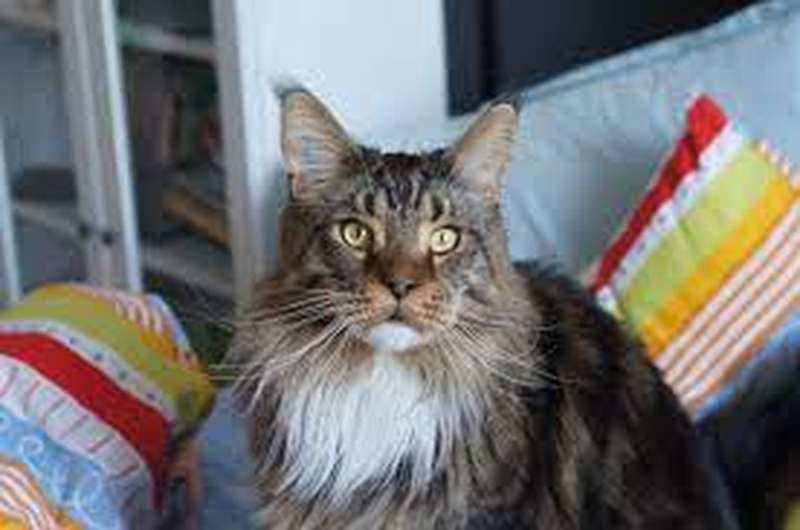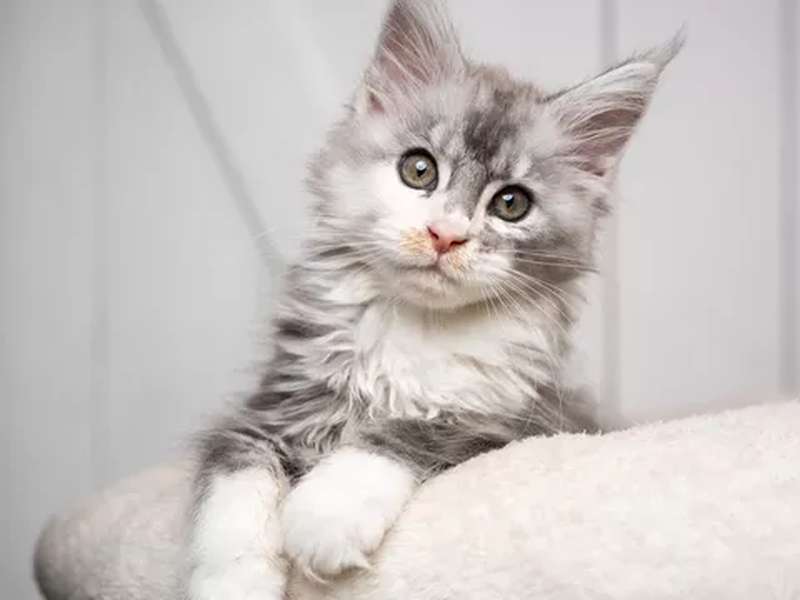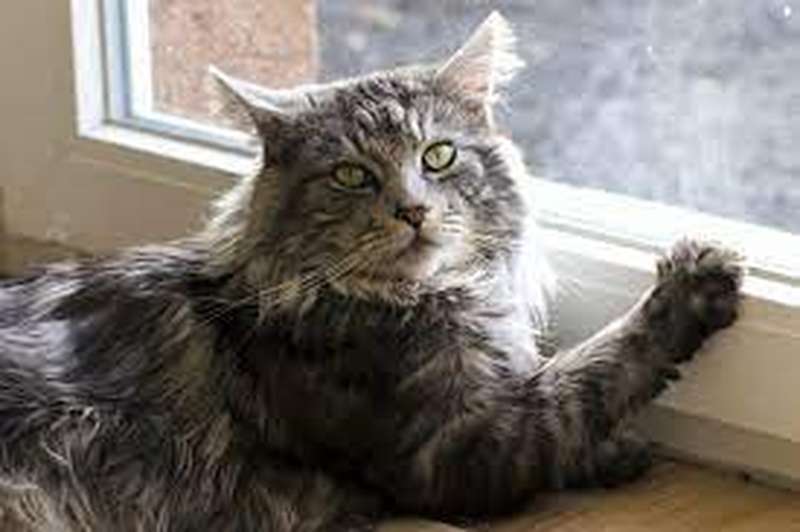Maine Coons are huge household cats. One of North America’s first natural breeds. The Maine Coon Cat is the official state cat of Maine, USA.
Description
The Maine Coon cat is a large, friendly cat with a noticeable ruff around its chest, robust bone structure, strong jawline, rectangular body form, uneven two-layered coat with a long, bushy tail, and stronger guard hairs on the top of a smooth satin undercoat.
After the breed’s 1970s rebirth, Maine Coon cats had a higher polydactylism rate than other breeds.

Afterward, breeders of show-standard cats were advised to consider this variation as undesirable and to offer affected kittens as household pets.
The trait was later independently certified by organizations such as The International Cat Association (TICA). In recent cat fancy competitions, an increasing number of judges no longer penalize cats for this particular trait.
Maine Coon At a glance
The only longhair breed said to be native to the U.S. is the Maine Coon cat.
Weight range:
Male: large: >12 lbs.
Female: medium: 8-12 lbs.
Eye color:
Copper, Green, Gold, Odd-eyed
Expectations:
Longevity Range: 9-13 yrs.
Social/Attention Needs: Moderate, High
Tendency to Shed: High
Coat:
Length: Long
Characteristics: Straight
Colors: White, Black, Blue, Red, Cream, Brown, Tortoiseshell, Bluecream, Golden
Pattern: Solid Color, Tortoiseshell, Bicolor, Tricolor/Calico, Smoke, Shaded
Less Allergenic: No
Overall Grooming Needs: High
Fur coat
Maine Coon Cats are medium- or long-haired cats. The coat is silky and velvety, depending on the hue. Some cats have a leonine ruff around their necks and shorter heads and shoulders than stomachs and flanks.
Due to their light-density undercoat, the breed requires less maintenance than other long-haired breeds. Winter fur is thicker than summer fur.
Colored coats
Maine Coons have any cat color. Some breed standards prohibit crossbreeding colors, including chocolate, lavender, Siamese pointed patterns, and “ticked” patterns. TICA and CFA allow the ticking pattern, though.
The breed is mostly brown tabby. Blue or heterochromia iridium (two different-colored eyes) in cats with coat colors other than white are not allowed by breed standards.
Personality
Maine Coons are “gentle giants” with above-average intelligence, making them easy to train. They are loyal to their family and cautious—but not mean—around strangers, but they are autonomous and not attached.
The Maine Coon is not a “lap cat,” but its kind nature makes it comfortable around dogs, other cats, and children. Some believe Maine Coons’ love of water derives from their ancestors’ time on ships.
Maine Coons are also known for their vocality. They frequently yowl, trill, chirp, and make other loud noises.
Diet
Maine Coon cats can typically consume the same food as other cat breeds. However, due to their high energy levels, they may require a slightly larger diet than average.
The Health of Maine Coon Cats
Both pedigreed cats and mixed-breed cats can experience different levels of health problems, some of which may be genetic. The Maine Coon may be affected by the following problems:
- Hip dysplasia is a condition that can cause lameness, particularly in severe cases.
- Hypertrophic cardiomyopathy is a type of heart disease that is inherited in Maine Coons. There is a DNA-based test available to identify cats that carry one of the mutations responsible for causing the disease.
- Polycystic kidney disease is a heritable kidney disease that progresses slowly and can eventually lead to renal failure.
- Spinal muscular atrophy is a genetic disorder that specifically impacts the skeletal muscles of the trunk and limbs. There is a test available that can identify carriers and affected kittens.
No matter how healthy your cat maybe when you first bring them home, it is important to be prepared for any potential health issues that may arise throughout their life. A pet insurance plan can assist you in being prepared for any veterinary needs your cat may have.
What can you anticipate from a kitten of a Maine Coon?
The Maine Coon kitten breed has long been admired for its enigmatic history and affectionate nature.
Maine Coon cats have experienced a significant increase in popularity over the past few decades. Especially in the United States, Ragdoll cats were ranked as the third most popular cat breed.

Unique Maine Coon Kitten Growth
The reputation of Maine Coon cats is that they get fairly huge!
It takes 3-5 years for them to reach their full size, which is 8-25 pounds (depending on age, gender, genetics, etc.).
Despite knowing these cats grow to be such gigantic gentle giants, many still fail to see how their extra-large proportions in adulthood affect their growing time.
Maine Coon cats grow 90% before 9-12 months but don’t stop growing until 3-5 years old. By 9 months, their tufted chests, manes, and paws will appear. However, their mane and chest tufts may continue to develop until they are about 2 years old.
Maine Coon Cat|Kitten Temperament
Maine Coons kittens are gentle, lively kittens. As with any kitten, Maine Coon cats are prone to hyperactivity and the zoomies! Your Maine Coon cat may play more than a “normal” moggy cat.
Maine Coons are kind and loving. This breed trait appears early on. Many Maine Coon kittens enjoy cuddling, so you may be lucky. If not, your Maine Coon kitten may need more time to feel comfortable cuddling.
Trainability
Maine Coon cats are one of the few domestic cat breeds that can be effectively trained.
There are numerous cat breeds that people consider to be “trainable,” but none of them can compare to the Maine Coon cat.
Maine Coon kittens are known for their high intelligence and dog-like behavior, making them responsive to your commands and capable of providing you with a lot of interaction and companionship.
Playfulness
Maine Coon cats and cats play a lot. Spending time with you, especially playing games, is fun for them. Remember that Maine Coon cats need about 30 minutes of playtime per day to be happy.
While kittens need about the same amount of playtime, the more time you spend playing with your Maine Coon kitten, the happier they will be now and as an adult.
Grooming standards
About two to three times per week, or more if your Maine Coon cat’s fur is prone to tangling, Maine Coons require grooming.
These cat brushes should be used during a thorough brushing session and perhaps even some nail trimming.
Although Maine Coon kittens don’t require as much grooming as older Maine Coon kittens, it’s still critical that owners instill the habit of grooming from an early age.
Suitable For Other Animals
Maine Coons get along well with other animals. They get along great with both dogs and cats, and they can even adjust to strange pets that may be allowed free rein in the house.
It’s crucial to understand that a Maine Coon kitten won’t get along with any small animals, such mice or birds, that live in your house.
Friendly to families
The Maine Coon cat is your best option if you’re seeking for a family cat.
A Maine Coon cat is a wonderful pet since they adore being part of the family, especially the males who enjoy being the focus of attention.
A Maine Coon cat yearns for human company, and you’ll quickly notice that they want to be around and pay attention to your every move.
Eating Patterns
Maine Coons are big cats. Big cats like to eat!
Big cats enjoy eating! Diets that are high in protein, low in carbohydrates, and moderately high in good fats and fatty acids are preferred by Maine Coons. In order to grow to their full-size potential, Maine Coons need a lot of protein as kittens.
Given that the Maine Coon cat breed is prone to obesity, it is crucial that owners do not overfeed their pets.
Cat adoption instructions
Find a reputable shelter or charity to adopt a cat. Online searches for local centers yield many of these. Cats Protection, Blue Cross, and RSPCA websites provide nearby rescue centers.
Purina is delighted to partner with Wamiz to help you locate your forever pet through local adoption services.
Once you’ve found a rescue center, most provide online directories of their cats for adoption, or you can ask the staff for guidance on the right cat for you.

Searching for the ideal cat
Ensuring that a cat’s personality aligns well with your family is crucial when considering adoption. Shelters can provide you with a comprehensive history of their residents’ backgrounds and offer guidance on which cats would be the most suitable for your family.
There are various breeds of cats.
Deciding whether to adopt a cat or acquire a kitten is a significant decision, just like choosing the right breed of cat for you. While personality traits can vary among individual cats, breed type can provide valuable insights and information.
Rescue centers typically offer a wide selection of breeds to choose from, including delightful moggies such as domestic short hair or long hair cats.
Take the time to research the different options available and consider reaching out to the staff at your local rehoming center for more information. They will possess a wealth of knowledge to help determine which breed may be suitable for you.
Making sure they’re healthy
It’s crucial to ensure that the cat is healthy before adopting it from a shelter. Ensure a kitten is fully weaned and at least 8 or 9 weeks old before you consider buying it. Check your prospective new pet’s health with the following checklist:
- Clean, clear eyes should not have any discharge because this could be a sign of a respiratory issue.
- The nose should be free of mucous and show no symptoms of sneezing. It should also be cool and slightly wet.
- Black specks and a dark brown, waxy discharge in the ear canal may be signs of ear mites; otherwise, the ears should be clear and pink. Although mites are simple to remove, they may indicate that the animal is not receiving adequate care.
- How does their stomach appear? Worms or inadequate nutrients could be to blame for a bloated stomach.
- Inspect their rear to look for any signs of diarrhea.
- The coat should be shiny and free of any matting.
- Legs should be straight and well-shaped so they may easily move about and jump.